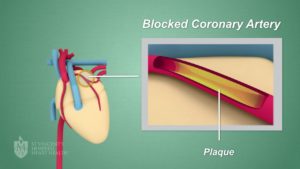Improve Psychological Well-being in Coronary Artery Disease Patients with Mindfulness-Based Art Therapy
By John M. de Castro, Ph.D.
“Given the proven role of stress in heart attacks and coronary artery disease, effective meditation would be appropriate for almost all patients with coronary artery disease.” – Joon Sup Lee
Cardiovascular disease is the number one killer, claiming more lives than all forms of cancer combined. “Heart disease is the leading cause of death for both men and women. About 610,000 people die of heart disease in the United States every year–that’s 1 in every 4 deaths. Every year about 735,000 Americans have a heart attack.” (Centers for Disease Control). “Coronary artery disease develops when the major blood vessels that supply your heart with blood, oxygen and nutrients (coronary arteries) become damaged or diseased. Cholesterol-containing deposits (plaque) in your arteries and inflammation are usually to blame for coronary artery disease.” – (Mayo Clinic)
A myriad of treatments has been developed for heart disease including a variety of surgical procedures and medications. But the safest effective treatments are lifestyle changes. These include quitting smoking, weight reduction, improved diet, physical activity, and reducing stresses. Safe and effective alternative treatments for cardiovascular disease are contemplative practices, such as meditation, tai chi, and yoga, have also been shown to be helpful for heart health. These practices have also been shown to be helpful for producing the kinds of lifestyle changes needed to prevent heart disease such as smoking cessation, weight reduction, and stress reduction.
In today’s Research News article “Effects of Mindfulness-Based Art Therapy on Psychological Symptoms in Patients with Coronary Artery Disease.” (See summary below or view the full text of the study at: https://www.ncbi.nlm.nih.gov/pmc/articles/PMC5852419/ ), Jang and colleagues studied the effectiveness of Mindfulness-Based Art Therapy (MBAT) on the psychological states of patients with coronary artery disease. They recruited outpatients with coronary artery disease and randomly assigned them to either receive 12 weeks, once a week for 45 minutes, of Mindfulness-Based Art Therapy (MBAT) or a treatment as usual control. MBAT was based on the Mindfulness-Based Stress Reduction (MBSR) Program and included meditation, yoga, and body scan practices along with training in expressing their emotions through art and drawing. Patients were measured before and after training for anxiety, depression, and anger.
They found that the MBAT trained patients in comparison to baseline and the treatment as usual group had large and significant reduction in depression, anxiety and depression following treatment. In addition, there were large and significant decreases in experiences of anger and expressions of anger and also increases in anger control. Hence, the Mindfulness-Based Art Therapy (MBAT) program was successful in improving the psychological well-being of patients with coronary heart disease.
It should be noted that there wasn’t an active control conditions so the conclusions must be tempered with the understanding that there were considerable opportunities for bias and participant expectations to affect the results and there was no long-term follow-up to determine the durability of the effects. The findings, however, are encouraging and should provide encouragement for conducting a larger trial with active control conditions, e.g. aerobic exercise and long-term follow-up.
So, improve psychological well-being in coronary artery disease patients with mindfulness-based art therapy.
“15 minutes of meditation a day reduced the risk of death, heart attack, and stroke by 48 per cent” – British Heart Foundation
CMCS – Center for Mindfulness and Contemplative Studies
This and other Contemplative Studies posts are also available on Google+ https://plus.google.com/106784388191201299496/posts and on Twitter @MindfulResearch
Study Summary
Jang, S.-H., Lee, J.-H., Lee, H.-J., & Lee, S.-Y. (2018). Effects of Mindfulness-Based Art Therapy on Psychological Symptoms in Patients with Coronary Artery Disease. Journal of Korean Medical Science, 33(12), e88. http://doi.org/10.3346/jkms.2018.33.e88
Abstract
Background
Mindfulness-based art therapy (MBAT) induces emotional relaxation in coronary artery disease (CAD) patients, and is a treatment known to improve psychological stability. The objective of this study was to evaluate the treatment effects of MBAT for CAD patients.
Methods
A total of 44 CAD patients were selected as participants, 21 patients belonged to a MBAT group, and 23 patients belonged to the control group. The patients in the MBAT group were given 12 sessions of treatments. To measure depression and anxiety, Beck Depression Inventory (BDI) and Trait Anxiety Inventory (TAI) were used. Anger and anger expression were evaluated using the State Trait Anger Expression Inventory (STAXI). The treatment results were analyzed using two-way repeated measures analysis of variance (ANOVA).
Results
The results showed that significant effects for groups, time, and interaction in the depression (interaction effect, [F(1,36) = 23.15, P < 0.001]; between groups, [F(1,36) = 5.73, P = 0.022]), trait anxiety (interaction effect, [F(1,36) = 13.23, P < 0.001]; between groups, [F(1,36) = 4.38, P = 0.043]), state anger (interaction effect, [F(1,36) = 5.60, P = 0.023]), trait anger (interaction effect, [F(1,36) = 6.93, P = 0.012]; within group, [F(1,36) = 4.73, P = 0.036]), anger control (interaction effect, [F(1,36) = 8.41, P = 0.006]; within group, [F(1,36) = 9.41, P = 0.004]), anger out (interaction effect, [F(1,36) = 6.88, P = 0.012]; within group, [F(1,36) = 13.17, P < 0.001]; between groups, [F(1,36) = 5.62, P = 0.023]), and anger in (interaction effect, [F(1,36) = 32.66, P < 0.001]; within group, [F(1,36) = 25.90, P < 0.001]; between groups, [F(1,36) = 12.44, P < 0.001]).
Conclusion
MBAT can be seen as an effective treatment method that improves CAD patients’ psychological stability. Evaluation of treatment effects using program development and large-scale research for future clinical application is needed.
https://www.ncbi.nlm.nih.gov/pmc/articles/PMC5852419/
